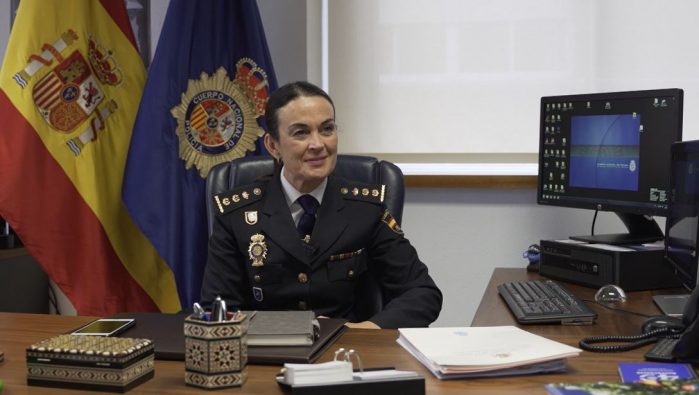-
25 March 2021
Category : Interview
The scars of gender-based violence are not always visible
The head of the Human Rights and Equality Area of the National Police, Commissioner María Dolores López, analyses gender inequality and tells us about the work of the Police to combat this problem
 The head of the Human Rights and Equality Area of the National Police, Commissioner María Dolores López, analyses gender inequality and tells us about the work of the Police to combat this problem
The head of the Human Rights and Equality Area of the National Police, Commissioner María Dolores López, analyses gender inequality and tells us about the work of the Police to combat this problemA conversation on gender violence and the work of the National Police to combat it with the head of the Human Rights and Equality Area, Commissioner María Dolores López, with the collaboration of América Pérez, Chief Inspector of the National Office for Gender Equality and Leticia Matarranz, Chief Inspector of the National Human Rights Office.
Is there a specific kind of violence that is committed against women? If so, why?
Yes, there is a specific kind of violence against women, simply because they are women. It manifests itself as the most brutal symbol of the inequality existing in our society, which is historical and which constitutes one of the most flagrant assaults on human rights.
This violence is rooted in gender inequalities that have been present for centuries in our society through stereotypes, gender roles and sexist ideas that we have been falsely taught about men and women.
When talking about violence against women, is it important to emphasise that there is physical but also psychological violence? Would you say that there are other areas or forms of violence against women?
Of course abuse is not always physical or only physical, and the scars are not always visible. It is important to bear in mind that in addition to physical abuse, there are other forms of violence, such as psychological, sexual, labour, economic, institutional and symbolic violence, which feed off the stereotypes, messages and values that they transmit and contribute to the continuing repetition of relationships based on inequality. There is now also talk of obstetric violence, where a person giving birth experiences mistreatment or disrespect of their rights, including being forced into procedures against their will, at the hands of medical personnel. Such violence has its roots in the disregard for women’s rights in a natural process such as childbirth and ends up affecting the right to privacy and physical integrity in some cases.
What role do public institutions, specifically the National Police, have in the fight against this problem?
Public institutions have a transcendental role in the fight against this scourge, not only because the constitutional mandate imposes the obligation to promote the conditions for freedom and equality to be real and effective and to remove the obstacles that prevent it on the public powers or as a result of the international commitments assumed by Spain, such as the Istanbul Convention, but also because the State has a duty to protect all its citizens. Spain’s public institutions have assumed this obligation since the promulgation of Organic Law 1/2004, which was a pioneering advance in the comprehensive protection of women against structural inequality linked to the lack of economic, social and cultural protection, including the development of specific preventive strategies on the matter, with the approval of the State Pact against Gender Violence.
In addition, the National Police, as part of the public institutions, and reinforcing its commitment to the defence of human rights, and particularly against any violation of them for reasons of gender, has established the promotion of comprehensive police action in the field of violence against women is an essential objective within its Institutional Strategic Plans.
Could you give some examples of the work of the Police against this violence?
In this context of prevention and fight against gender violence, and in order to improve the quality of service for victims, within Spain’s National Police, the first care services for women were created in 1986, known as SAM, which evolved into today’s Units of Attention to the Family and Women (UFAM) under the Judicial Police Area.
Based on the recognition of the uniqueness and complex characteristics of gender violence, the UFAM are specialised units that constitute the comprehensive police response service for dealing with gender violence, domestic violence, crimes against sexual freedom and crimes committed against minors.
Do you consider that society is committed to fighting violence against women?
Of course, society plays a fundamental role in combating this violence.
Despite the fact that Spain is a pioneer country in eradicating gender violence in all its forms and that society is committed to its eradication, data shows that there is still much work to be done. For this, an institutional, political and social consensus is needed that shows a seamless commitment of all the institutions to Spanish society.
To carry this out, it would be necessary to promote awareness-raising actions on the damage caused by inequality and violent behaviour, as has happened in recent campaigns in which the focus has been on the abuser and the victim’s environment.
It is crucial for victims to receive external support in escaping a situation of gender violence, as women who suffer it feel humiliated, having been isolated and had their self-esteem undermined in advance by the perpetrators. Faced with this scenario, the family and the victim’s most intimate circle have a privileged position to advise her and, if necessary, accompany her to report.
Although awareness should begin in the early stages of childhood, through education transmitted by families and should be reinforced in schools through the promotion of relationships based on respect and equality. Only if we act from the beginning will the fruits of prevention and awareness be obtained.
The views and opinions expressed in this blog are the sole responsibility of the person who write them.




